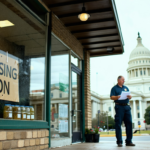Detroit City Council Proposes Restrictions on Marijuana Ads Near Sensitive Locations
Detroit City Council is considering new regulations to restrict marijuana advertisements in the city, particularly near locations that may have an impact on children. The proposed changes to the city code would prohibit marijuana ads from being within a 1,000-foot radius of sensitive properties such as schools, child care centers, and parks.
Council member Angela Whitfield Calloway is leading the effort, citing concerns for children’s health and well-being. She notes that the proliferation of marijuana in schools has been exacerbated by the legalization of marijuana in Michigan in 2018, resulting in over 1,700 reported incidents and hospitalizations among students as young as elementary age.
Whitfield Calloway believes that the oversaturation of marijuana advertisements contributes to the normalization of harmful behaviors and aims to reduce subconscious exposure to these ads. The proposed ordinance would mirror restrictions on alcohol and tobacco advertising, aiming to prevent the normalization of harmful behaviors.
The proposed ordinance would also require companies to remove ads within 60 days if a new sensitive property is developed within 1,000 feet of an existing advertisement. Violators could face a misdemeanor and fines up to $500 and up to 90 days in jail.
The proposal would not apply to advertisements adjacent to highways or freeways, which are regulated by the Michigan Highway Advertising Act of 1972. Additionally, signs at convention centers, sports arenas, or stadiums would be exempt.
During a recent City Council meeting, a young boy expressed his concerns about the prevalence of marijuana advertisements in the city, stating that he was worried about kids getting hooked on it. Whitfield Calloway has asked the city’s legislative policy division to investigate whether the city has the right to restrict the number of billboards in the city.
The proposed ordinance is set to be referred to committee next Tuesday and is expected to be voted on by the City Council in the future.












